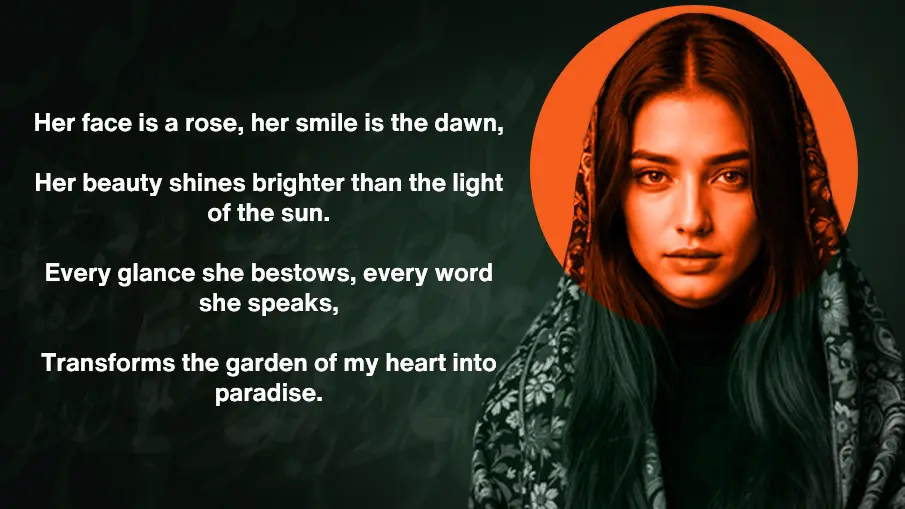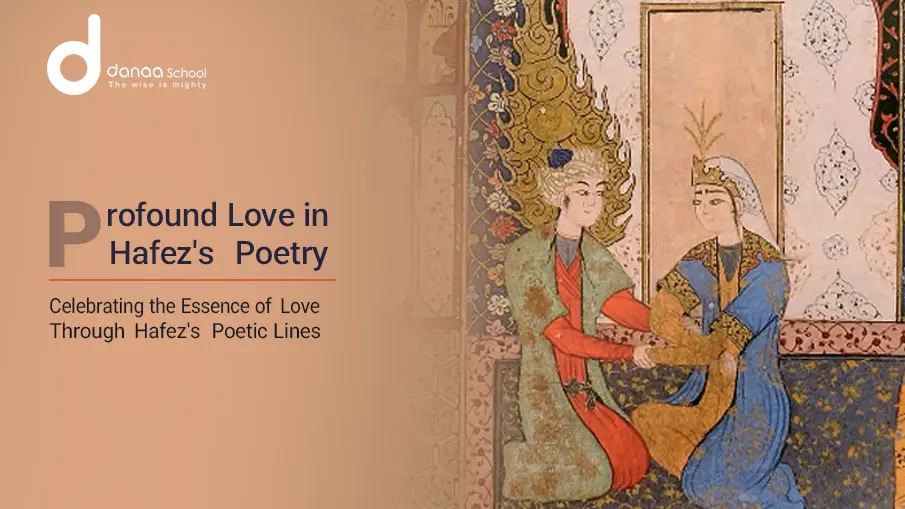Best Hafez Poems in English: 8 Beautiful Verses from the Divan of Hafez
Hafez poems in English are an excellent starting point for readers who want to explore Persian poetry through short yet meaningful verses. One of the most celebrated voices in this tradition is Hafez, whose Divan reflects love, mysticism, and the depth of the human experience. Below are eight selected poems from the Divan of Hafez (English translation), each followed by a brief note to clarify its symbolism and theme.
1. The Cup of Wine
With a cup of wine in my hand, I delight in my own soul,
For I have found the jewel hidden in the heart of the rose.
The tavern’s flame brightens the dark night of my spirit,
And the ruby wine is the light that guides me through life.
Theme: Wine and the tavern symbolize inner awakening and spiritual joy. The “jewel” represents self-discovery and truth—one of Hafez’s signature ways of blending mysticism with worldly imagery.
2. The Beloved’s Beauty

Her face is a rose, her smile is the dawn,
Her beauty shines brighter than the light of the sun.
Every glance she bestows, every word she speaks,
Transforms the garden of my heart into paradise.
Theme: The beloved’s beauty becomes a bridge between earthly love and spiritual love—an essential Hafez motif in which beauty always points beyond itself.
3. The Path of Love
On the path of love, there are no boundaries or borders,
Every heart must travel the same weary road.
But with every step, the burden grows lighter,
For love is the light that guides us home.
Theme: Love is portrayed as a transformative journey. Difficulty and devotion coexist, yet love ultimately becomes guidance and return.
4. The Morning Breeze
The morning breeze whispers secrets of the dawn,
The garden blossoms, kissed by the dew’s embrace.
O friend, wake up and drink the nectar of life,
For the flowers fade as swiftly as the night’s shadow.
Theme: A reflection on impermanence. Morning, dew, and blossoms remind the reader to live consciously and appreciate fleeting moments.
5. The Tavern’s Door
At the tavern’s door, the world’s troubles melt away,
The wine of truth flows freely, intoxicating the soul.
Seek not the path of righteousness or sin,
But follow the heart’s desire and find your way.
Theme: The tavern symbolizes freedom and authenticity. Hafez challenges rigid moral labels and points toward sincerity and inner direction.
6. The Nightingale’s Song
In the quiet of the night, the nightingale sings,
Its melody a lament for the lost rose.
O seeker, listen and learn from its sorrow,
For the heart that loves deeply knows true pain.
Theme: The nightingale and rose represent longing and devotion. Love is shown as both beautiful and painful—joy and vulnerability intertwined.
7. The Desert’s Mystery
In the vast desert, the mirage dances,
The oasis a dream in the traveler’s eye.
But amidst the sand and sun’s harsh glare,
The true treasure lies hidden in the heart.
Theme: Mirage and oasis symbolize illusion and desire. The poem redirects the search for meaning inward, toward perseverance and self-knowledge.
8. The Rose Garden
In the rose garden, every petal tells a story,
Each bloom a testament to life’s fleeting grace.
O gardener of the soul, tend to your blossoms,
For the fragrance of love is the sweetest reward.
Theme: The rose garden mirrors the soul. Each blossom represents a moment to nurture with care, attention, and awareness of time’s passing.
If you enjoyed these Hafez poems in English, you may also want to explore deeper insights into Hafez’s life, themes, and symbolism in our complete guide to Hafez.
Find Your Perfect Teacher
At Danaa School, you can find your Persian Poetry Tutor from all qualified and experienced teachers.
Now experience the excellent language and poetry journey.

FAQs
Who was Hafez?
Hafez (Khwāja Shams al-Dīn Muḥammad Ḥāfeẓ) was a 14th-century Persian poet from Shiraz, widely regarded as one of the greatest lyric poets in Persian literature. His ghazals explore love, spirituality, ethics, and human longing through rich symbolism.
What is the Divan of Hafez?
The Divan of Hafez is a collected anthology of Hafez’s ghazals (lyric poems). It is one of the most-read works in Persian literature and is often approached both as poetry and as a source of reflection on mysticism, love, and life.
How can I study Persian literature?
Start with a short, structured reading plan: begin with accessible poets (Saadi, Hafez, Rumi), read a few poems at a time with brief notes, and keep a glossary of recurring symbols (wine, rose, nightingale, tavern). If you are learning Persian, study a parallel text (Persian + English) to build vocabulary and cultural context.
Why is Hafez's poetry still relevant today?
Hafez remains relevant because his themes are timeless—love, hope, doubt, joy, hypocrisy, and spiritual searching. His layered imagery allows different readers to find meaning at different stages of life, which keeps the poems fresh across cultures and generations.
Are these Hafez poems in English literal translations?
Not always. Many English versions of Hafez are poetic renderings rather than word-for-word translations, because Persian ghazals use layered symbolism and cultural references. For study purposes, it helps to compare multiple English translations or use a parallel Persian–English text.
What is a ghazal in Persian poetry?
A ghazal is a lyric poem built from couplets that share a rhyme and refrain pattern, often centered on love, longing, and spiritual reflection. Hafez is especially famous for mastering the ghazal form.
What do “wine” and the “tavern” mean in Hafez’s poetry?
In Hafez’s symbolism, wine and the tavern can represent joy, spiritual awakening, freedom from hypocrisy, or divine love—depending on the poem. These images are often metaphorical rather than literal.
What is the best way to read Hafez for beginners?
Start with short selections, read slowly, and focus on one theme at a time (love, impermanence, longing, spiritual insight). A brief theme note or glossary of symbols can make the poems much easier to understand.
Where should I go next after reading these 8 poems?
A good next step is to read more ghazals from the Divan and explore background notes on Hafez’s themes and recurring symbols. If you’re learning Persian, try reading a parallel Persian–English edition to build both language and literary understanding.
Conclusion
Interested in diving deeper into the world of Persian poetry and literature? At Danaa School, we offer a vibrant community and rich resources for anyone looking to explore the profound wisdom of poets like Hafez. Whether you’re a beginner or a seasoned enthusiast, our programs provide a comprehensive understanding of Persian culture and its literary heritage. Join us and start a journey that will enlighten your mind and enrich your soul. Start your journey now.
Want to Learn Persian Poetry at Danaa School?
Here are the best resources for you!










